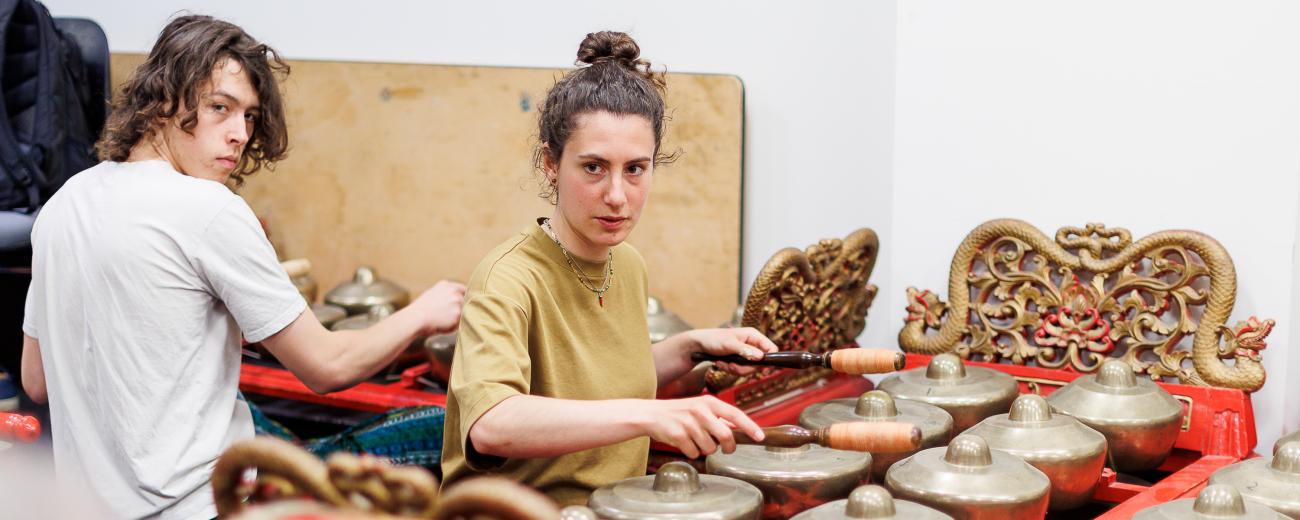BA Music and...


Key information
- Duration
- 3 or 4 years
- Start of programme
- September
- Attendance mode
- Full-time
- Location
- Russell Square, College Buildings
- Fees
-
Home student fees: £9,250
Overseas student fees: £21,990Please note that fees go up each year.
See undergraduate fees for further details. - Entry requirements
-
AAB-ABB
For joint degrees, the offer is based on the subject with the higher entry requirements
Contextual: ABB-BBB
-
See undergraduate entry requirements and English language requirements for international and alternative entry requirements.
Course overview
The BA Music combined degree is a unique opportunity to study the musical traditions of Asia, Africa, the Middle East, and their global diasporas.
SOAS Music has an international reputation for providing a platform for musicians, industry specialists, and researchers from around the world. Students study music from a variety of perspectives, including ethnomusicology, anthropology, politics, and history, and survey a broad range of Asian and African musical cultures.
In years 2 and 3 they are encouraged to develop their own interests by focusing on specific regions and by considering cross-regional themes, from music and gender to the music business.
Performance is a central component of the degree. You will develop expertise in a great variety of musical performance traditions. The course combines academic and practical skills: students are trained in research methods, critical theories, fieldwork practice, sound recording, podcasting, presentation skills, and musical performance.
Some two-subject programmes are completed in 3-years while others take 4-years and include a year abroad.
Why study Music at SOAS?
- SOAS is ranked 15th in the UK for Arts and Humanities (QS World University Rankings 2023).
- We're ranked 6th in the UK for employability (QS World University Rankings 2023).
- SOAS Music is ranked 1st in the UK for research impact and 5th overall in the Research Excellence Framework (REF) 2021
- We received 100% overall student satisfaction (NSS 2021).
Degree combinations
May be combined with
- Arabic +, TW63 BA/MSA
- Chinese +, TW13 BA/MSCH
- Development Studies , LW93 BA/MSDVS
- East Asian Studies , T4W3 EaMu
- History , VW3 BA/MSH
- History of Art , VW33 BA/HAAM
- International Relations, LT33
- Japanese +, TW21 BA/MSJ
- Korean +, TWLJ BA/MSKO
- Languages and Cultures , TTW3 LC/Mu
- Politics, TTM3
- Social Anthropology , LW63 BA/SAMS
- World Philosophies , W302 BA/MSSEA
+ 4-year degree with (compulsory) 1-year abroad
++ 3 or 4-year degree with option of 1-year abroad
Key information set data
Structure
First-year modules provide an introduction to ethnomusicology and popular music studies from global perspectives, explore debates in music and aesthetics, and develop students’ academic and interpretative skills. Students also study a variety of Asian and African music cultures through performance.
In Years 2 and 3, students can study music cultures from different regions (Africa, the Middle East, South Asia, East Asia, and Jewish music) and may also choose to study thematic courses, skills-based and industry-related topics, and performance.
Occasionally the availability of optional modules changes as a result of staffing and other circumstances. Students who had signed up for such modules will be notified as soon as possible and given the opportunity to choose from available alternatives.
Important notice
The information on the website reflects the intended programme structure against the given academic session. The modules are indicative options of the content students can expect and are/have been previously taught as part of these programmes. However, this information is published a long time in advance of enrolment and module content and availability is subject to change.
Year 1
Compulsory modules
Students will take the following compulsory modules:
And
Modules from second subject
Students choose modules to the value of 60 credits from their second subject
Year 2
Compulsory modules
Students will take the following compulsory modules:
And
Guided options
Students take modules to the value of 30 credits from the Year 2-3 Guided Option module list.
And
Modules from second subject
Students choose modules to the value of 60 credits from their second subject
Year 3
Compulsory modules
Students will take the following compulsory modules:
And
Guided options
Students take modules to the value of 30 credits of any of the following combinations:
- 30 credits from the Year 2-3 Guided Option modules list
- 15 credits from the Year 2-3 Guided Option module list and 15 credits from the language open option list or the non-language open option list.
- 30 credit Independent Study Project in Music:
And
Modules from second subject
Students choose modules to the value of 60 credits from their second subject
Year 2 and 3 guided option modules
Teaching and learning
The Department of Music has been highly rated for teaching and research in all recent assessment exercises, and is regularly ranked amongst the top Music departments in the UK in Good University Guides.
Music students have access to the large Main Library of the School which holds numerous books, journals and recordings relevant to the study of ethnomusicology and world music, as well as the nearby British Library Sound Archive and other London libraries and museums.
The SOAS Library holds copies of standard reference works on music, such as the current edition of the New Grove Dictionary of Music and Musicians. The Grove dictionary and the RILM database can also be accessed on line from computer terminals in the Library or elsewhere on the SOAS network. Listening facilities are provided in the Library, and most CDs are available on short loan. Among special items in the Department’s collections are:
- field recordings, films and slides
- a large working collection of musical instruments from Asia and Africa
- extensive staff collections relating to specific research interests
Contact hours
All full-time undergraduate programmes consist of 120 credits per year, in modules of 30 or 15 credits. They are taught over 10 or 20 weeks. The programme structure shows which modules are compulsory and which optional.
As a rough guide, 1 credit equals approximately 10 hours of work. Most of this will be independent study. It will also include class time, which may include lectures, seminars and other classes. Some subjects, such as learning a language, have more class time than others. In the School of Arts, most undergraduate modules have a one- or two-hour lecture or seminar every week. Some, but not all, also have a 1-hour seminar or tutorial every week.
Year abroad
If you are studying a language as part of your combined honours degree, you will usually study for 4 years, with year 3 spent abroad.
Fees and funding
Fees for 2023/24 entrants per academic year
| Programme | Full-time | |
|---|---|---|
| UK students | Overseas students | |
| BA, BSc, LLB | £9,250 | £21,160 |
| BA/BSc Language year abroad | £1,385 | £10,580 |
Please note that fees go up each year.
Employment
Students in the School of Arts develop a critical and theoretically informed approach to global arts and culture. In addition to an intercultural awareness and practical expertise, graduates gain a wide portfolio of transferable skills especially which are sought after in the creative and cultural industries.
Recent graduates have been hired by:
- Christie’s
- Christine Park Gallery
- Crisis
- Design Museum
- Hong Kong Museum Of Art
- India Foundation For The Arts
- Japanese Gallery
- Museum of East Asian Art
- Music in Detention
- National Gallery
- Pan Arts
- People Projects Culture & Change
- Roundhouse Trust
- Somerset House Trust
- Songlines Magazine
- Sotheby's
- South Asian Art UK
- Stratford Circus Arts Centre
- Taiwan Embassy
- The Alliance for Global Education
- The British Embassy
- The National Museum Of Korea
- The Royal Collection
- Victoria and Albert Museum
Find out more at Careers Service.


